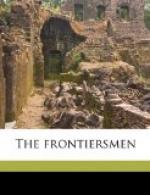Perhaps never was a brave man more dismayed and daunted. Not death alone, but fire and torture menaced him. The shining liquid delight in the eyes of the women reminded him of the strange fact that they were ever the most forward in these cruel pleasures, for the ingenuity of which the Cherokees were famous among all the tribes. Yet the realization of his peril did not so diminish his scope of feeling as to prevent him from inwardly upbraiding his ill-starred generosity as the folly of a hopeless fool, more especially as the elder woman—she of the many tears—held up the substantial gift of provisions, jeering at him with a look in her face that did not need to be supplemented by the scoffing of language.
“The auld randy besom!” the soldier commented within himself. “But eh, I didna gie it to be thankit,—nae sic a fule as that comes to, neither!”
Hoping against hope, he thought that the length of his absence would inevitably alarm the ensign for his scout’s safety, when it should attract attention, and induce the officer to send a party for his relief and for further investigation of the precipice, whence the smoke intimated an ambush of the enemy. This expectation had no sooner suggested its solace and the exercise of patience in the certainty of ultimate rescue, than the Highlander began to mark the preparations among the Indians for a swift departure. But how? The precipice was a sheer descent for eighty feet, the ruggedness of its face barely affording foothold for a bird or a mountaineer; and at its base hovered the ensign’s party within striking distance. A resisting captive could not be withdrawn by this perilous path. The soldier looked in doubt and suspense about the restricted limits of the cavity in the great crag. The mystery was soon solved.
The position of all had changed in the struggle, and from where Kenneth MacVintie now stood he noted a scant suggestion of light flickering down from a black fissure in the roof of the cavity, and instantly realized that it must give an exit upon the mountain slope beyond. The agility with which Attusah of Kanootare sprang up and leaped into it was admirable to behold, but MacVintie did not believe that, although knotted up as he was in his own plaid passed under his arms and around his waist for the purpose, he could be lifted by the ends of the fabric through that aperture by the strength of any one man. Naturally he himself would make no effort to facilitate the enterprise. On the contrary, such inertness as the sheer exercise of will could compass was added to his dead weight. Nevertheless he rose slowly, slowly through the air. As he was finally dragged through the rift in the rocks, his first feeling was one of gratification to perceive that no one man could so handle him. The feat had required the utmost exertions of two athletic Indians pulling strenuously at the ends of the plaid passed over a projection of rock, thus acting pulley-wise, and the good Glasgow weave was shedding its frayed fragments through all the place by reason of the strain it had sustained.




